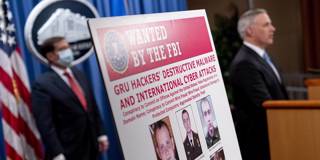Traditionally, the US has favored a largely unstructured internet in order to promote the free flow of ideas and information. But US enthusiasm for such an internet is waning as foes exploit this openness to undermine its democracy and steal intellectual property important to the functioning and comparative advantage of its economy.
NEW YORK – During the Cold War, summit meetings between the United States and the Soviet Union were often dominated by agreements to set limits on nuclear weapons and the systems built to deliver them. The US and Russia still discuss these topics, but at their recent meeting in Geneva, US President Joe Biden and Russian President Vladimir Putin focused in no small part on how to regulate behavior in a different realm: cyberspace. The stakes are every bit as great.
It’s not hard to see why. Cyberspace and the internet are central to the workings of modern economies, societies, political systems, militaries, and just about everything else, which makes digital infrastructure a tempting target for those seeking to cause extraordinary disruption and damage at minimal cost.
Moreover, states and nonstate actors can carry out cyberattacks with a high degree of deniability, which adds to the temptation to develop and use these capabilities. We know when and from where a missile is launched, but it can take a long time to discover that a cyberattack has occurred, and figuring out who is responsible can take even longer. Such a slow and uncertain attribution process can render the threat of retaliation, which is at the heart of deterrence, beyond reach.

NEW YORK – During the Cold War, summit meetings between the United States and the Soviet Union were often dominated by agreements to set limits on nuclear weapons and the systems built to deliver them. The US and Russia still discuss these topics, but at their recent meeting in Geneva, US President Joe Biden and Russian President Vladimir Putin focused in no small part on how to regulate behavior in a different realm: cyberspace. The stakes are every bit as great.
It’s not hard to see why. Cyberspace and the internet are central to the workings of modern economies, societies, political systems, militaries, and just about everything else, which makes digital infrastructure a tempting target for those seeking to cause extraordinary disruption and damage at minimal cost.
Moreover, states and nonstate actors can carry out cyberattacks with a high degree of deniability, which adds to the temptation to develop and use these capabilities. We know when and from where a missile is launched, but it can take a long time to discover that a cyberattack has occurred, and figuring out who is responsible can take even longer. Such a slow and uncertain attribution process can render the threat of retaliation, which is at the heart of deterrence, beyond reach.